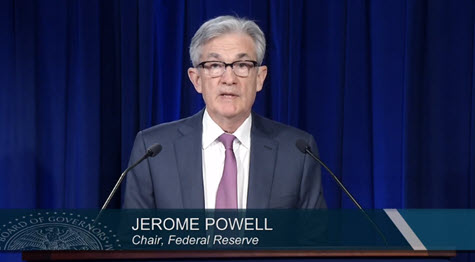Coronavirus Response
Real Estate Roundtable’s DeBoer Discusses Coronavirus Policy Responses and Need for Future Actions

Roundtable President and CEO Jeffrey DeBoer, above, discussed the government’s legislative and regulatory responses to the economic impact of the coronavirus pandemic – and what those policies mean for commercial real estate – in a BisNow webinar yesterday and Real Estate Executive Council Town Hall today. (Watch April 30 Bisnow interview)
- The discussions addressed the Paycheck Protection Program (PPP), new Federal Reserve credit lending facilities and the need for a national renter assistance program.
- DeBoer noted that the federal response to the pandemic’s economic shockwave have provided bridge relief, and that the Small Business Administration’s (SBA) PPP and the Fed’s TALF credit facility could be improved to increase their effectiveness.
- The Roundtable’s Covid-19 Resource Center includes an “8-Point Plan” to improve the PPP. Additionally, the SBA on April 29 released an updated PPP FAQs document.
Restoring The Rent Obligation Chain & Future Issues
DeBoer emphasized in his discussions that there is a vital need to “restore the rent obligation chain” to benefit business and residential tenants, owners, lenders, local budgets and retirement investments. (Bisnow video)
- Before the pandemic crisis, there was clarity on the likely income real estate assets could generate by rental obligations and contracts. However, now those income streams are impaired. The future of certain businesses are unknown; tenants in shared buildings may default; and how employers can retain or regenerate jobs is uncertain. DeBoer noted that these challenges can be addressed by fixing the rental obligation chain.
- DeBoer also said future issues that should be addressed include business liability, as building owners anticipate the return of occupants, workers and visitors – along with government support for a Pandemic Risk Insurance Program, which could be modeled on the highly successful Terrorism Risk Insurance Program established in the wake of 9/11.
- The Real Estate Roundtable recently established a Building Re-Entry Working Group to address issues associated with building re-entry, as state and local authorities seek to re-start economic sectors and allow people to return to work.
- DeBoer also discussed what future legislative packages may include to jumpstart the economy, including infrastructure investment.
Other Roundtable videos address how the crisis has affected real estate tax issues, along with other topics, on its Youtube channel.
# # #
News
Congressional Republicans and Democrats Clash on Including Covid-19 Business Liability Protections in Future Pandemic Relief Legislation

Liability concerns in a post-coronavirus world are influencing congressional negotiations about the next pandemic relief package as states move forward on easing business restrictions and employers across the country consider plans to reopen. (AP, April 28 and The Hill, May 1)
- With the Senate scheduled to return to Washington on May 4, policymakers are staking their priorities about stimulus and other measures that may be included in the next round of Covid-19 related legislation. The House announced this week they will delay their return until May 11 due to concerns about coronavirus in Washington, DC.
- Senate Majority Leader Mitch McConnell (R-KY) and House Minority Leader Kevin McCarthy (R-CA.) said in a joint statement today that any future stimulus bill must include liability protections for employers. “Senate and House Republicans agree these protections will be absolutely essential to future discussions surrounding recovery legislation,” according to the statement.
- McConnell on Tuesday referred to the protections as his "red line" during an interview with Fox News. "Let me make it perfectly clear, the Senate is not interested in passing a bill that does not have liability protection. ... What I'm saying is we have a red line on liability. It won't pass the Senate without it," he added. (Fox interview, April 24)
- House Speaker Nancy Pelosi (D-CA) on Wednesday said employees returning to work should have increased safety protections. “Especially now, we have every reason to protect our workers and our patients in all of this. So we would not be inclined to be supporting any immunity from liability,” Pelosi stated during a press briefing. (National Review, April 29)
- Senate Minority Leader Chuck Schumer (D-NY) on Tuesday said employers pushing workers to return to unsafe conditions during the pandemic should not receive protections. He stated, “If an employer makes an employee do something that is untenable, shouldn’t an employee have some rights here?” (Bloomberg, April 28).
Negotiations on the next pandemic bill in Congress will intensify this month, as Democrats are expected to push for massive assistance to help state and local governments meet tax revenue shortfalls that pay for essential services.
# # #
Capital and Credit
The Fed Expands Main Street Loan Program to Reach More Businesses; Fed Chair Powell Urges Lawmakers to Take Further Fiscal Measures

The Federal Reserve yesterday announced an expansion of its $600 billion Main Street Lending Program (MSLP) to help credit flow to small and medium-sized businesses that were in sound financial condition before the pandemic. (Fed news release and Wall Street Journal, April 30)
- As part of its broad effort to support the economy, the Fed’s action will assist businesses that were either unable to access the Small Business Administration's (SBA) Paycheck Protection Program (PPP) or that require additional financial support after receiving a PPP loan. It is important to note that MSLP loans (as opposed to PPP loans) are not forgivable.
- Three separate facilities make up the MSLP: (1) the Main Street New Loan Facility (MSNLF); (2) the Main Street Priority Loan Facility (MSPLF); and (3) the Main Street Expanded Loan Facility (MSELF). (Steptoe, comparison chart, May 1)
The changes include:
• Creating a third loan option, with increased risk sharing by lenders for borrowers with greater leverage;
• Lowering the minimum loan size for certain loans to $500,000 from $1 million; and
• Expanding the pool of businesses eligible to borrow for businesses that may already have significant debt.
- Businesses with up to 15,000 employees or up to $5 billion in annual revenue are now eligible, compared to the initial terms, which were for companies with up to 10,000 employees and $2.5 billion in revenue.
- According to Steptoe, each MSLP facility uses the same borrower eligibility criteria and have similar commercial components – including the same term (four years), interest rate (LIBOR plus 3%), deferral of principal and interest for one year, and permit prepayment without penalty. For lenders, the risk retention requirement varies: 5% for the MSNLF and MSELF, and 15% for the MSPLF.
- The Roundtable and Nariet on April 22 wrote to Treasury Secretary Steven Mnuchin and Fed Chairman Jay Powell to request specific changes that would enable CRE borrowers to more efficiently access the Main Street New Loan Facility (MSNLF) and Main Street Expanded Loan Facility (MSELF). (Joint letter, April 22)
- The joint industry letter addresses (1) Underwriting/ Leverage Limitations/ Loan Size, (2) Distributions/ REITs (3) Loan Terms (4) Applicable Interest Rate Index and (5) Program Timing.
The Fed states that a start date will be announced soon for the MSLP. (Main Street Lending Program FAQs, April 30)
Fed Chairman Powell Recommends More Fiscal Response
Federal Reserve Chair Jay Powell on Wednesday said concerns about the rising national debt should not limit the federal government’s efforts to counter the coronavirus pandemic’s economic impact.
- After announcing the Fed would leave interest rates near zero, Powell included a rare commentary on fiscal policy, urging lawmakers to pursue do more to support the economy. (Bloomberg, April 29)
- "This is the time to use the great fiscal power of the United States to do what we can to support the economy,” Powell said. "The time will come again and reasonably soon I think where we can think about a long-term way to get the fiscal house in order, and we absolutely need to do that ... But in my personal view, this is not the time to let that concern ... get in the way of us winning this battle," he stated. (Video and statements of The Fed’s news conference)
- Powell added, “I would say that it may well be the case that the economy will need more support from all of us if the recovery is to be a robust one.” He also noted that "our credit facilities are wide open. We can do more on that front." (MarketWatch, April 29)
- The Fed Chairman issued a somber warning of the long-term consequences of the coronavirus economic crisis. “These thousands of great medium- and small-size businesses are worth so much more to the economy than the sum of their net assets,” Powell said. (Wall Street Journal, April 29)
- He added, “It is heartbreaking, frankly, to see that all threatened now. Everyone is suffering here, but those who are least able to bear it are the ones who are losing their jobs and losing their incomes and have little cushion to protect them.”
Powell added, that the Fed will use its powers “forcefully, proactively, and aggressively until we’re confident that we’re solidly on the road to recovery.” (Video and statements of The Fed’s news conference)
# # #

